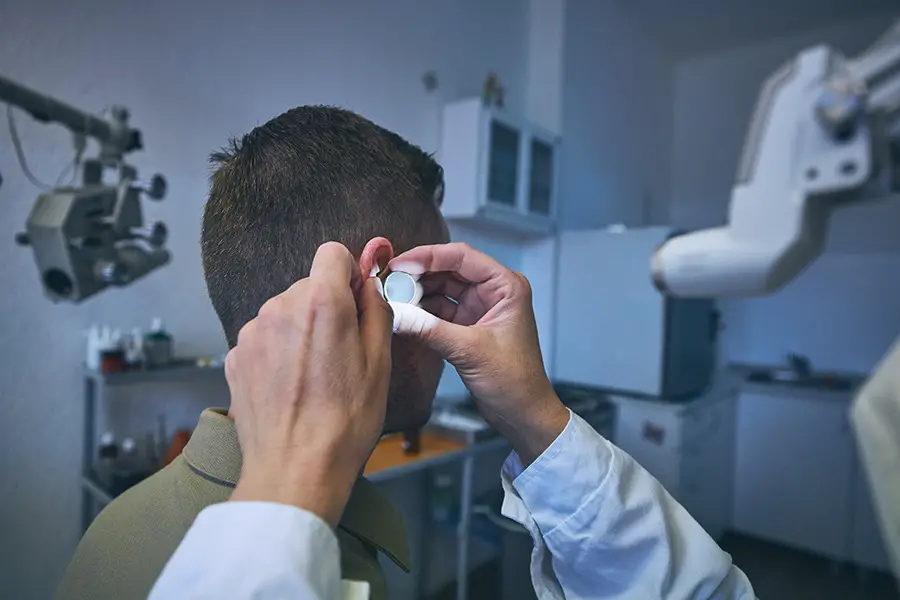Introduction
As a concerned parent, you’re always on the lookout for information that can help protect and nurture your child. One such issue that warrants attention is the connection between meningitis and hearing loss. In this comprehensive guide, we will delve into various aspects of this critical topic, providing you with the knowledge and encouragement you need to take the right steps for your child’s well-being. By understanding the risks, symptoms, and treatment options, you can empower yourself to make informed decisions and create a safer environment for your little ones.
Throughout this blog post, we will explore several sub-topics related to meningitis and hearing loss in a storytelling format. Each sub-title contains valuable insights and information, presented in an engaging and relatable manner. As you journey through these sections, you’ll find encouragement, guidance, and a newfound understanding of this crucial subject.
Join us as we navigate this important conversation, delving into the science, experiences, and possibilities associated with meningitis and hearing loss. By the end of this guide, you’ll be equipped with the knowledge and tools needed to provide the best possible care for your child, ensuring their health, happiness, and future success.
Meningitis and Hearing Loss: A Silent Connection
The link between meningitis and hearing loss is a critical one, as the infection can sometimes cause damage to the auditory nerve or inner ear. This damage can result in mild to profound hearing loss, which can significantly impact a child’s development and quality of life. For some children, this hearing loss may be temporary, but for others, it may be permanent.
Understanding this connection is essential for concerned parents, as early detection and intervention can make all the difference in a child’s life. By recognizing the symptoms of meningitis and seeking prompt medical attention, you can minimize the risk of hearing loss and other complications. Moreover, regular hearing screenings can help identify any issues early on, enabling prompt treatment and support.
The more informed you are about the relationship between meningitis and hearing loss, the better prepared you will be to protect your child’s hearing health. It is essential to be proactive and stay vigilant, as early intervention is the key to preventing further complications and ensuring the best possible outcomes.
Recognizing the Symptoms: A Parent’s Guide to Meningitis and Hearing Loss
Meningitis is an infection that causes inflammation of the protective membranes around the brain and spinal cord, known as the meninges. This inflammation can result from bacterial, viral, or fungal infections, with bacterial meningitis being the most severe and potentially life-threatening. Early recognition of meningitis symptoms is crucial for prompt treatment and reducing the risk of complications, such as hearing loss.
Common symptoms of meningitis include high fever, severe headache, neck stiffness, vomiting, sensitivity to light, confusion, and drowsiness. In infants, meningitis symptoms may present as irritability, poor feeding, a bulging fontanel (soft spot on the head), and a high-pitched cry. It is important to remember that these symptoms can develop rapidly, and a child’s condition may deteriorate quickly.
If you suspect your child may have meningitis, it is crucial to seek medical attention immediately. Do not wait for all symptoms to appear or for the condition to worsen, as prompt treatment can save your child’s life and help prevent complications like hearing loss. By staying vigilant and acting quickly, you can protect your child’s health and ensure their well-being.
The Lasting Impact: Long-term Effects of Meningitis and Hearing Loss
Meningitis can have lasting effects on a child
‘s hearing, with the severity of hearing loss ranging from mild to profound. The extent of the damage depends on several factors, including the type of meningitis, the severity of the infection, and the timeliness of treatment. In some cases, the hearing loss may be temporary, but in others, it may be permanent.
Long-term effects of meningitis-induced hearing loss can significantly impact a child’s development, communication skills, and overall quality of life. Children with hearing loss may struggle with speech and language acquisition, social skills, and academic performance. It is essential to recognize the potential long-term impact of meningitis on a child’s hearing and take proactive steps to mitigate these effects.
Early intervention is critical in addressing the long-term effects of meningitis-related hearing loss. This may include the use of hearing aids, cochlear implants, or other assistive devices, as well as speech and language therapy, educational support, and social skills development. By providing the appropriate support and resources, parents can help their child overcome the challenges of hearing loss and lead a fulfilling life.
Protecting Your Child: Meningitis Vaccination and Prevention
One of the most effective ways to protect your child from meningitis and its potential complications, such as hearing loss, is through vaccination. Meningitis vaccines can help prevent several types of bacterial and viral meningitis, significantly reducing the risk of infection and its associated complications.
Vaccination schedules for meningitis vary depending on the child’s age and the specific vaccine. In general, meningitis vaccines are given during infancy and early childhood, with booster doses recommended at specific intervals. It is essential to consult with your child’s healthcare provider to ensure they receive the appropriate vaccines and follow the recommended vaccination schedule.
In addition to vaccination, other preventive measures can help protect your child from meningitis. These include maintaining good hygiene practices, such as frequent handwashing, avoiding contact with sick individuals, and ensuring your child gets enough rest and maintains a healthy lifestyle. By taking these precautions, you can significantly reduce the risk of meningitis and its potential impact on your child’s hearing health.
Tinnitus: why it’s still such a mystery to science
When Hearing Loss Strikes: Coping Strategies for Parents
The discovery of hearing loss in your child, whether due to meningitis or other causes, can be an overwhelming and emotional experience. It is natural for parents to feel a range of emotions, from shock and disbelief to sadness and anger. However, it is essential to remember that with the right support and resources, children with hearing loss can lead happy and successful lives.
To help your child cope with hearing loss, it is crucial to educate yourself about the available resources, treatment options, and support networks. This may include learning about hearing aids, cochlear implants, and other assistive devices, as well as exploring communication strategies such as sign language or cued speech.
Additionally, connecting with other parents of children with hearing loss can provide invaluable support and encouragement. Sharing experiences, exchanging information, and offering emotional support can help parents navigate the challenges of raising a child with hearing loss. By building a strong support network, you can provide the best possible care for your child and help them thrive despite the challenges they face.
QUIZ - CAUSES AND THE LEVELS OF TINNITUS
The Role of Early Intervention in Overcoming Meningitis-Related Hearing Loss
Early intervention is critical in addressing the challenges associated with meningitis-related hearing loss. The sooner a child receives appropriate support and resources, the better their chances of overcoming developmental and communication obstacles. Early intervention can help minimize the impact of hearing loss on a child’s development and significantly improve their overall quality of life.
An essential aspect of early intervention is regular hearing screenings. These screenings can help identify any issues early on, enabling prompt treatment and support. This is particularly important for children who have experienced meningitis, as they may be at a higher risk of developing hearing loss.
Beyond screenings, early intervention may include the use of hearing aids, cochlear implants, or other assistive devices, as well as speech and language therapy, educational support, and social skills development. By taking a proactive approach and seeking the necessary resources, parents can help their child overcome the challenges of meningitis-related hearing loss and lead a fulfilling life.

Nurturing Support: Strategies for Living with Conductive Hearing Loss
Discover effective strategies for individuals with conductive hearing loss, including support groups, therapy, and practical tips for daily living. Enhance emotional well-being and build a strong support system for a fulfilling life.

Understanding Conductive Hearing Loss: Debunking Myths, Discussing Diagnosis, and Managing Expectations
Caring for someone with conductive hearing loss can be challenging. Gain insights and support for effectively managing this condition and debunking common myths.
Embracing Technology: Assistive Devices for Children with Hearing Loss
Advancements in technology have led to the development of various assistive devices that can significantly improve the lives of children with hearing loss. From hearing aids and cochlear implants to specialized communication devices, technology can help bridge the communication gap and empower children to reach their full potential.
Hearing aids and cochlear implants are the most common assistive devices for children with hearing loss. While hearing aids amplify sounds, cochlear implants directly stimulate the auditory nerve, bypassing the damaged parts of the inner ear. The choice between these devices depends on the severity of the hearing loss, as well as the child’s specific needs and circumstances.
In addition to these devices, other assistive technologies can support communication and learning for children with hearing loss. These may include FM systems, which transmit the speaker’s voice directly to the child’s hearing aid or cochlear implant, and captioning services for television and movies. By embracing technology and incorporating assistive devices into their daily lives, children with hearing loss can thrive academically, socially, and emotionally.
The Power of Community: Support Groups for Parents and Children
Navigating the challenges of meningitis-related hearing loss can be an isolating and overwhelming experience for both parents and children. However, connecting with others who share similar experiences can provide invaluable support, encouragement, and camaraderie. Support groups for parents of children with hearing loss, as well as groups for the children themselves, can help foster a sense of community and belonging.
These groups offer a safe space for parents to share their experiences, exchange information, and offer emotional support. Similarly, children with hearing loss can benefit from connecting with peers who understand their unique challenges, building friendships and developing social skills in a supportive environment.
Many organizations and online platforms offer resources and support for families affected by hearing loss. By seeking out these communities and forging connections, parents and children can find the strength and resilience needed to face the challenges of meningitis-related hearing loss and lead fulfilling lives.
Conclusion
In this comprehensive guide, we have explored the various aspects of meningitis and hearing loss, equipping you with the knowledge and encouragement needed to make informed decisions and create a safer environment for your child. By understanding the risks, symptoms, and treatment options, you can take proactive steps to protect your child’s hearing health and ensure their well-being.
The journey through meningitis and hearing loss may be filled with challenges, but with the right support, resources, and attitude, your child can overcome these obstacles and thrive. As a concerned parent, your role in recognizing the symptoms of meningitis, seeking prompt medical attention, and providing ongoing support is critical in shaping your child’s future.
Let this guide serve as a beacon of hope and encouragement, empowering you to be the best advocate for your child’s hearing health. By staying informed, proactive, and vigilant, you can make a difference in your child’s life, ensuring their health, happiness, and future success.






